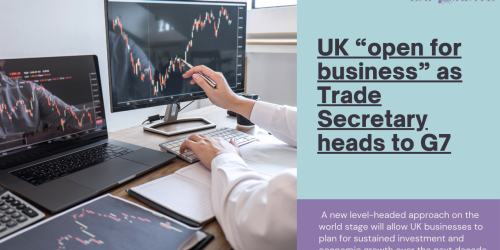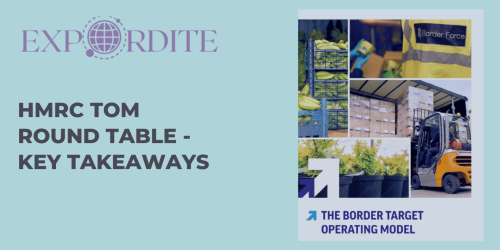10 UK Export News You Might’ve Missed – Week 26

In this edition of Export News from Expordite, we’ll cover the top 10 UK export news and headlines from week 26 of 2024 — June 24th- 30th, 2024.
Key News
-
UK says importers making ‘deliberate errors’ on forms to avoid Brexit border charges
-
Tory Minister Has Finally Admitted That Brexit Has Been Bad For Many British Businesses
-
UK clothing exports to EU rise, but trade deficit also grows
General Export News
1. Extension of the UK’s steel safeguard measure
“The Secretary of State for Business and Trade has decided to extend the UK’s steel safeguard measure on all 15 categories and the application of the suspension for Ukraine for a further 2 years, to 30 June 2026.“
Source: GOV.uk
2. UK says importers making ‘deliberate errors’ on forms to avoid Brexit border charges
“The government has accused businesses importing goods from the EU of making “deliberate” and “criminal” errors on key documentation in a bid to avoid new Brexit border charges.
In a notice sent out to traders this week, the government said it had been made aware that some traders and logistics companies were repeatedly filling out forms incorrectly, and vowed to crack down on the behaviour. It comes just weeks after the government brought in new checks for plant and animal goods coming into Britain from the EU.
The notice said deliberate misdeclarations on forms were a criminal offence and port health authorities would be actively looking for such behaviour and taking action if evidence is found.“
Source: The Guardian
3. EU exports of pork to UK dwindling
“EU countries have exported 181,800 tonnes of pork and pork meat products to the United Kingdom in the first quarter of 2024. Although that might seem a lot, it is the lowest Q1 volume on record, excluding 2021 when Brexit had a severe impact on trade, the agricultural levy board AHDB reports.
The situation might get significantly worse in the rest of this year because of the new border controls the UK introduced on April 30th. The British Meat Processors Associations BMPA warns that the cost of those controls are highly underestimated. ‘’The estimates are misleading,’’ Peter Hardwick, Trade Policy Advisor says.”
Source: Pig Progress
4. A Tory Minister Has Finally Admitted That Brexit Has Been Bad For Many British Businesses
“A Tory minister has admitted that leaving the European Union has been bad for many British businesses.
Kevin Hollinrake said there was “no doubt” that exporting to the EU has been made more difficult by Brexit.
Speaking on Radio Four’s Today programme this morning, Hollinrake said: “There’s no doubt, for some businesses, it is more difficult to trade with the European Union. There is no doubt that is the case.”
He added: “For some businesses, particularly in the food and drink sector, particularly SMEs (small and medium-sized enterprises), they’re finding it more difficult to trade with the European Union. That’s the reality.“
Source: Huffington Post UK
5. UK’s participation in CPTPP and opportunities for Vietnam
“The UK’s participation in the Comprehensive and Progressive Agreement for Trans-Pacific Partnership (CPTPP) is expected to provide more opportunities for Vietnamese firms to expand export markets and create momentum for economic development, according to experts.
On July 16, 2023, the UK signed a treaty to join the pact, making it the first new member of the CPTPP since the deal was set up in 2018, paving the way for the admission of more new members.
Together with the British Government’s efforts to take steps in ratifying the pact, CPTPP member countries, including Vietnam, have also worked to complete their own internal legalisation processes. On June 25, the National Assembly of Vietnam ratified a resolution approving the UK’s accession protocol to the CPTPP.”
Source: Vietnam+
6. UK clothing exports to EU rise, but trade deficit also grows
“UK apparel and textiles exports rose almost 7% to £9.1bn from £8.5bn last year with a 28% increase since 2012, the UK Fashion & Textile Association (UKFT) said on Wednesday.
The rise came as apparel exports alone rose to £6.2bn in the five-year period, a value increase of £1.8bn.
However, the figures also suggested that there could be disruption ahead as the country extricates itself from its long-term membership of the EU. In 2016 the European trade bloc was the UK’s biggest export market and accounted for 74% of the products it exported.“
Source: Fashion Network
7. Downturn in UK factory orders eases but export demand weak
“British manufacturing orders contracted in June at a reduced pace compared with a month earlier, despite a sharp drop in export orders, according to a survey from the Confederation of British Industry.
Its monthly gauge of new manufacturing orders rose in June to -18 from -33 in May, a three-month high, while expectations for output rose to their highest level since October.
Exporters, however, reported a tougher month, with the CBI’s indicator of export orders falling to its lowest since February 2021.”
Source: CyprusMail
8. Are you willing to risk the costs of not exporting?
“While 2024 may not feel like the best time to start selling to the rest of the world, Food Manufacture’s recent webinar heard from a range of experts on why avoiding exporting could be a big mistake for UK food and drink businesses.“
Source: Food Manufacture
9. What does the UK food industry want from the next government?
“It is fair to say agri-food issues, even macro concerns around food security or the fight against obesity, haven’t been front and centre in the debates leading up to the UK’s General Election on 4 July.
Nor have they figured significantly in the main parties’ manifestos, only perhaps peripherally, as in the Labour manifesto, in relation to subjects like skills, labour and relations with the EU.
A letter was penned to UK party leaders by the National Farmers’ Union (NFU), British Retail Consortium (BRC), the Food and Drink Federation (FDF) and foodservice body UKHospitality.
In their message, the trade bodies said the parties had highlighted plans for “defence and energy security” in recent weeks” but argued there has been “very little” about food security.“
Source: JustFood
10. What the three main parties represent for international trade
“Labour is focused on rebuilding EU relations, the Lib Dems want to rejoin the single market and the Tories want to press ahead with work so far
Two years of intense inflation has ensured the electorate could scarcely be more aware of the link between food prices and issues such as EU relations and trade deals. So how do the main parties plan to finally unlock Britain’s post-Brexit potential?“
Source: The Grocer
Want to get more international trade content straight to your inbox?






